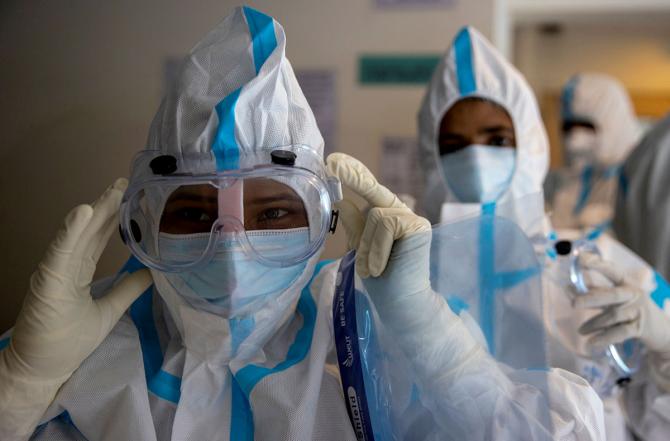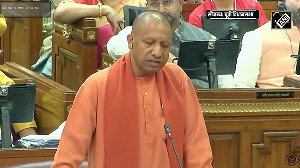About 47 per cent of the COVID-19 deaths in the country have been recorded among those aged below 60 years, the Centre said on Tuesday and cautioned against any laxity towards taking precautions, stating that respiratory diseases escalate in winter.

Addressing a press briefing, Secretary in the Health Ministry Rajesh Bhushan said about 70 per cent COVID-19 victims in the country have been men and 30 per cent women.
About 53 per cent of the victims were aged 60 years and above, he said, reiterating that elderly people and those with comorbidities are at high risk.
"Also, 35 per cent deaths were recorded in the age group of 45-60 years, 10 per cent in the age group of 26-44 years and one per cent each in the age group of 18-25 years and below 17 years," Bhushan said.
Providing data on the case fatality rate among different age groups -- with and without comorbidities -- he said in the age group of 60 years and above, 24.6 per cent of the victims had comorbidities while 4.8 per cent had no comorbidity.
In the age group of 45-60 years, 13.9 per cent of the victims had comorbidities while 1.5 per cent had no comorbidity.
Among the patients aged below 45 years, those with comorbidities accounted for 8.8 per cent of the fatalities while 0.2 per cent did not have any comorbidity.
The overall case fatality rate of people with comorbidities stood at 17.9 per cent and for those without comorbidities, it was 1.2 per cent, Bhushan said.
He further said that there has been a decline in the cumulative, weekly and daily COVID-19 positivity rates, which stand at 8.07 per cent, 6.24 per cent and 5.16 per cent respectively.
"The average daily COVID-19 positivity rate has declined from 8.50 per cent between September 9-September 15 to 6.24 per cent between October 7-October 13," the official said.
He added that there are 8,38,729 active COVID-19 cases in the country currently and the number has been below nine lakh for the fifth consecutive day.
Presenting data, Bhushan said there has been a "significant increase" in testing for COVID-19 and there is a continuous decline in the positivity rate.
On an average, 11,36,000 tests are being conducted on a daily basis.
The health secretary further informed that 14 states and Union territories have a higher tests per million figure and a lower positivity rate than the national average.
"Although the positivity rate is declining, it is very important to maintain the high numbers and level of testing," he said.
Bhushan pointed out that there has been a continuous decline in the number of daily cases over the last five weeks. The weekly average of daily cases fell from 92,830 in the second week of September to 70,114 in the second week of October.
In view of the upcoming festivals and winter season, NITI Aayog member (Health) Dr V K Paul urged people to keep following a COVID-appropriate behaviour such as wearing masks and maintaining social distancing diligently, saying there is no reason to get lax if a stability in the number of coronavirus cases is observed.
He cautioned that fresh COVID-19 cases have increased in many countries with the arrival of winter.
Stating that a second peak is being witnessed in many countries and lockdowns are being imposed, Paul said some people are becoming lenient about following the dos and don'ts.
He said the coronavirus is a respiratory virus and these viruses attack more in winter.
People will be more prone to respiratory infections such as pneumonia and influenza in the coming winter months and festive season, he added.
Paul appealed to people to wear masks mandatorily and stay away from gatherings, stating that scientific estimates have shown that the pandemic can be controlled up to 36-50 per cent in this manner.
Indian Council of Medical Research Director General Dr Balram Bhargava said the council has decided upon a cut-off of 100 days for re-infection if it occurs, as antibodies are also assumed to have a life of four months, according to some studies.
"It is still work in progress," he added.
Replying to a query on mutations of SARS-COV2, he said minor changes called 'drifts' may happen from time to time, but major genetic mutations of viruses or 'shifts' may happen in about a decade or two.
In this context, the effectiveness of a vaccine will not be determined by minor 'drifts', Bhargava said.
Responding to a question on extending financial support to vaccine manufacturers for conducting human clinical trials, Bhushan said through the Department of Biotechnology, the government is providing direct financial assistance to designated vaccine manufacturers to assist in research and development activities, which presently includes pre-clinical trials, and in future, may be extended for clinical trials also.
On a media query on the cold-chain infrastructure for vaccines, he said a sub-group of the National Committee for Vaccine Administration has already mapped the available cold-chain infrastructure being utilised for the government's immunisation programme and made projections for additional requirements.
Presently, the group is engaged in mapping the private sector facilities that could serve the needs of supplementing the cold-chain equipment.
Bhushan said 10 states -- Maharashtra, Karnataka, Kerala, Andhra Pradesh, Tamil Nadu, Uttar Pradesh, West Bengal, Assam, Chhattisgarh and Telangana -- account for 79 per cent of the active COVID-19 cases in the country.
Till two weeks ago, Kerala was not in the list and now, it is at the third spot, he said.
Maharashtra accounts for 25.38 per cent of the active cases, Karnataka 13.81 per cent and Kerala 11.26 per cent.
"We are conducting meetings with these states separately and forming strategies on how to fight COVID," Bhushan said.












 © 2025
© 2025